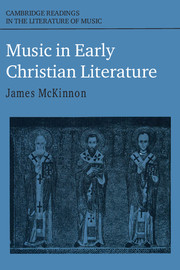Book contents
- Frontmatter
- Contents
- Preface
- Introduction
- 1 The New Testament
- 2 The Christian literature of the first and second centuries
- 3 The Greek authors of the third century
- 4 Western authors of the third and early fourth centuries: Carthage and Rome
- 5 Fourth-century Alexandria and desert monasticism
- 6 Fourth-century Asia Minor: the Cappadocians
- 7 Palestine, Antioch and Syria
- 8 The Greek historians
- 9 The Apostolic Constitutions, Egeria, and the eastern councils
- 10 Western authors of the fourth and early fifth centuries
- 11 Augustine and minor western authors
- Epilogue
- Bibliography
- Index of musical and liturgical terms and concepts
7 - Palestine, Antioch and Syria
Published online by Cambridge University Press: 05 June 2012
- Frontmatter
- Contents
- Preface
- Introduction
- 1 The New Testament
- 2 The Christian literature of the first and second centuries
- 3 The Greek authors of the third century
- 4 Western authors of the third and early fourth centuries: Carthage and Rome
- 5 Fourth-century Alexandria and desert monasticism
- 6 Fourth-century Asia Minor: the Cappadocians
- 7 Palestine, Antioch and Syria
- 8 The Greek historians
- 9 The Apostolic Constitutions, Egeria, and the eastern councils
- 10 Western authors of the fourth and early fifth centuries
- 11 Augustine and minor western authors
- Epilogue
- Bibliography
- Index of musical and liturgical terms and concepts
Summary
The authors of this chapter have in common only a rough geographic proximity; they are none the less among the most important of the period. Indeed John Chrysostom ranks first among all church fathers in the quantity of his musical reference. What he has to say, moreover, is at least comparable in interest to that of any of his contemporaries. The significance of Ephraem is of an altogether different sort: writing in Syriac rather than Greek or Latin, his importance lies in his singularity. The typical patristic polemical reflex seems absent from his works and the hackneyed allegorizing as well; in their place is a rich and original musical imagery that tempts one to think his attitudes toward practical music might be more friendly than those of his Greek and Latin colleagues.
Cyril of Jerusalem (c.315–386)
Cyril was appointed bishop of Jerusalem in about 349 and held the position until his death, although banished a number of times by his Arian superiors. The principal work attributed to him is a set of twenty-four catechetical lectures, rich in liturgical allusion. There is an opening lecture, the Procatechesis, and eighteen subsequent lectures, the catecheses proper, delivered in Lent of c.350 to the catechumens at Jerusalem who were to be baptized on Holy Saturday. These are followed by five lectures, the Mystagogicai Catecheses, addressed to the newly baptized during Easter week.
- Type
- Chapter
- Information
- Music in Early Christian Literature , pp. 75 - 95Publisher: Cambridge University PressPrint publication year: 1987



